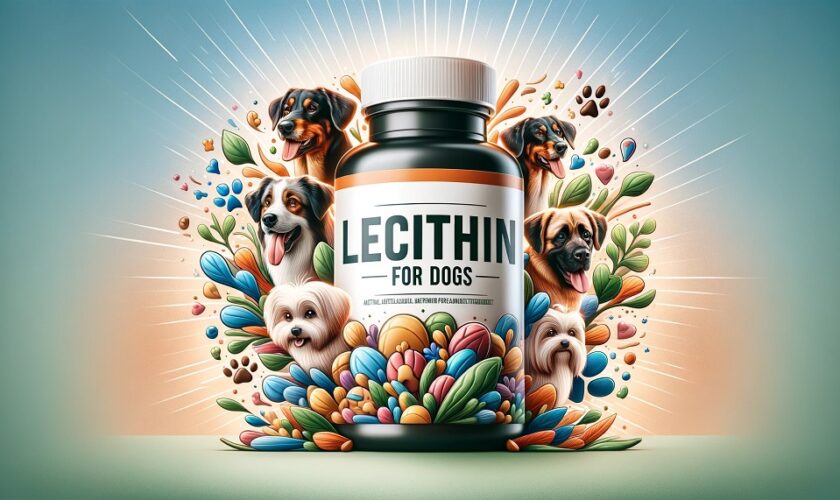When it comes to the health and well-being of our furry companions, we are constantly on the lookout for natural and safe supplements to enhance their quality of life. Lecithin, a common dietary supplement for humans, has also gained popularity as a potential health booster for dogs. In this article, we’ll explore the benefits and uses of lecithin for dogs (Puainta®), shedding light on how this natural compound can promote the health and vitality of your canine companion.
What is Lecithin?
Lecithin is a fatty substance that is found naturally in many plant and animal tissues. It is a vital component of cell membranes and is composed of various phospholipids, including phosphatidylcholine, phosphatidylethanolamine, and phosphatidylinositol. Lecithin can be derived from sources like soybeans, eggs, and sunflower seeds and is widely used in the food industry as an emulsifier and thickening agent
What is Lecithin Used For?
Improved Digestive Health
Lecithin can play a crucial role in supporting your dog’s digestive system. It helps emulsify fats, making them easier to digest and absorb. This can be particularly beneficial for dogs with digestive issues, such as pancreatitis or food sensitivities. By aiding in the breakdown of dietary fats, lecithin can reduce the strain on the pancreas and promote better nutrient absorption.
Skin and Coat Health
Many dog owners have reported improvements in their pet’s skin and coat condition after incorporating lecithin into their diet. Lecithin contains essential fatty acids that can help maintain healthy skin, prevent dryness, and reduce itching. Additionally, it may contribute to a shinier and more lustrous coat.
Cognitive Function
Lecithin contains phosphatidylcholine, which is a precursor to acetylcholine, a neurotransmitter that plays a crucial role in cognitive function and memory. Some studies suggest that supplementing with lecithin may support cognitive health in dogs, especially as they age. It could potentially help maintain mental alertness and memory retention.
Liver Health
The liver is a vital organ responsible for detoxification and metabolic processes. Lecithin has been studied for its potential to support liver health by aiding in fat metabolism. In some cases, it may be beneficial for dogs with liver disease or those at risk of developing liver issues.
Allergies and Immune Support
Lecithin’s ability to support a balanced immune system may benefit dogs with allergies or autoimmune conditions. While it is not a cure, lecithin’s role in modulating immune responses may help reduce the severity of allergic reactions.
What Foods Have Lecithin?
Lecithin is a naturally occurring fatty substance that is found in a variety of foods. It is commonly used as an emulsifier in food products to help mix and stabilize ingredients that do not naturally combine well, such as oil and water. Here are some foods that contain lecithin:
- Soybeans: Soybeans are one of the richest sources of lecithin. Soy lecithin is commonly used in a wide range of processed foods, including chocolate, baked goods, and salad dressings.
- Eggs: Lecithin is found in the yolks of eggs. It’s one of the reasons egg yolks are often used in emulsified sauces like mayonnaise.
- Sunflower seeds: Sunflower seeds also contain lecithin, and sunflower lecithin is sometimes used as an alternative to soy lecithin in food products.
- Wheat germ: Wheat germ is another natural source of lecithin.
- Nuts: Some nuts, like peanuts and cashews, contain lecithin in varying amounts.
- Whole grains: Whole grains like wheat, barley, and oats contain small amounts of lecithin.
- Seafood: Certain types of fish, such as mackerel and sardines, contain lecithin in their flesh.
- Vegetables: Some vegetables, including spinach, cauliflower, and broccoli, contain small amounts of lecithin.
- Dairy products: Lecithin can also be found in small amounts in dairy products like milk and cheese.
How to Incorporate Lecithin into Your Dog’s Diet
Lecithin supplements for dogs are available in various forms, including capsules, granules, powder, and liquids. Before introducing lecithin to your dog’s diet, it’s essential to consult with your veterinarian. They can provide guidance on the appropriate dosage based on your dog’s size, age, and specific health needs.
Lecithin supplements can be administered directly or mixed with your dog’s food. Be sure to follow the recommended dosage instructions provided on the product label or as advised by your veterinarian.
Conclusion
Lecithin is a versatile supplement that offers several potential benefits for dogs, including improved digestive health, enhanced skin and coat condition, support for cognitive function, liver health, and immune system modulation.
When used appropriately and under professional guidance, lecithin can be a valuable addition to your dog’s wellness regimen, contributing to their overall health and happiness.
